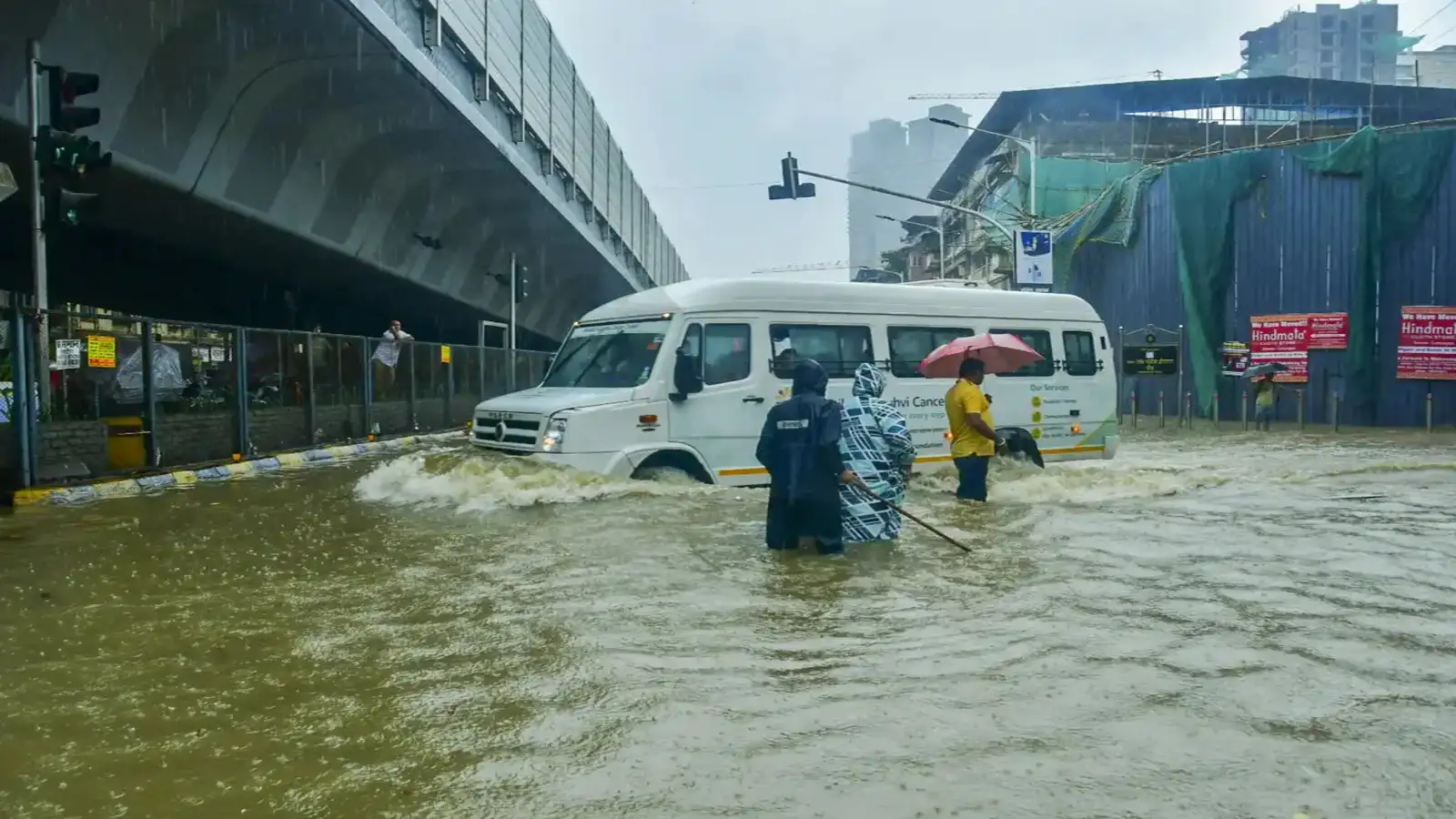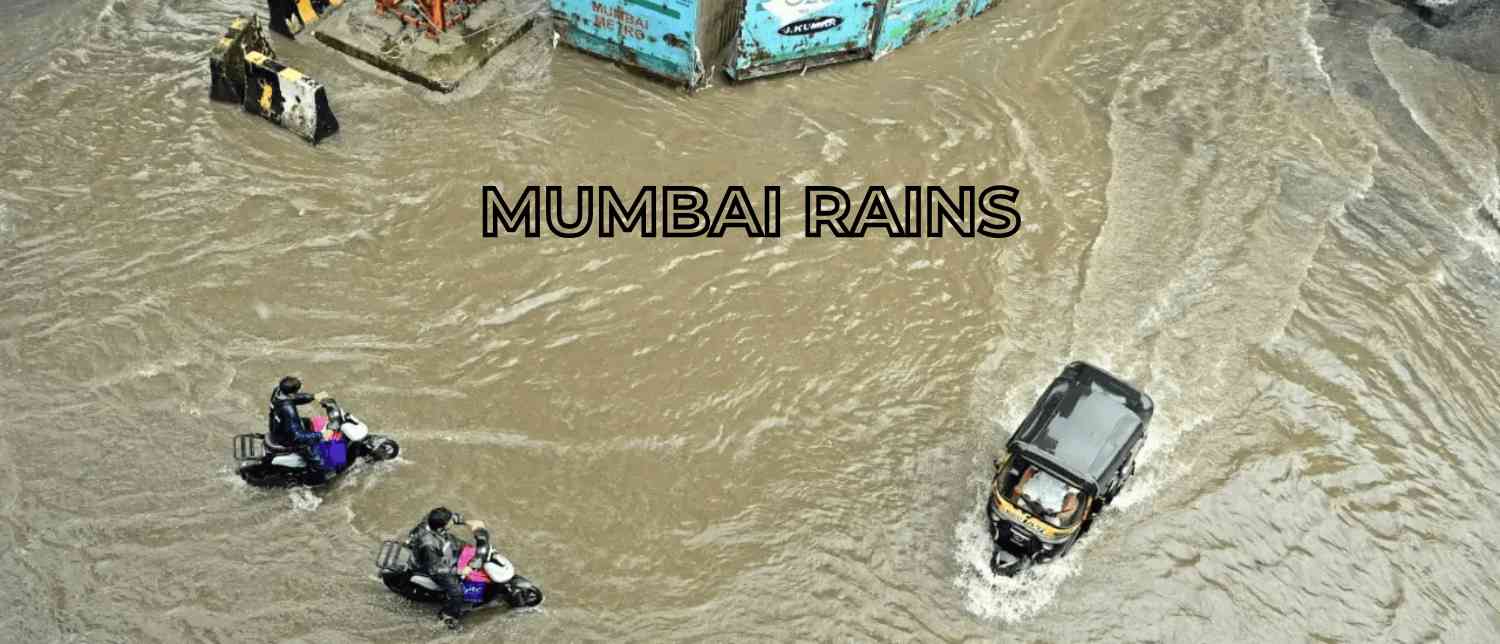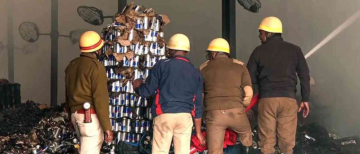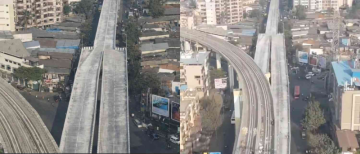Mumbai, India’s financial capital, is once again grappling with the fury of relentless monsoon rains. The city, known for its resilience, has come to a near standstill as heavy downpours battered several areas, leaving roads submerged, train services suspended, and thousands of residents struggling with waterlogging. With the Mithi River touching the danger mark at Kurla, fears of flooding in nearby residential areas have heightened. The situation remains critical as the India Meteorological Department (IMD) has issued a red alert, warning of extremely heavy rainfall in Mumbai and its suburbs until August 21.

VIDEO | Maharashtra: Rainfall lashes parts of Mumbai. Night visuals from Mira Road.
(Full video available on PTI Videos- https://t.co/dv5TRARJn4) pic.twitter.com/JQOyhQvghc— Press Trust of India (@PTI_News) August 18, 2025
Torrential Rainfall Leaves Mumbai Waterlogged
Over the past 24 hours, many parts of Mumbai have recorded rainfall exceeding 200 mm. The eastern suburb of Vikhroli reported the highest downpour at 255.5 mm, turning major roads into waterlogged ponds. Other areas such as Borivali, Andheri, Sion, Dadar, and Chembur also experienced heavy rainfall through the night, which continued into Tuesday morning.
Key rainfall figures between Monday night and Tuesday morning:
-
Vikhroli: 194.5 mm
-
Santacruz: 185 mm
-
Juhu: 173.5 mm
-
Byculla: 167 mm
-
Bandra: 157 mm
-
Colaba: 79.8 mm
-
Mahalaxmi: 71.9 mm
As a result, waterlogging has been reported in multiple low-lying areas including Gandhi Market, Chembur, Dadar Hindmata, Wadala, Matunga, and Bandra-Khar Link Road, severely impacting road traffic and leaving commuters stranded. The Andheri subway, one of the busiest connecting routes, remains completely submerged and closed for traffic.
#WATCH | Maharashtra: Waterlogging seen as heavy rain lashes Mumbai. Visuals from Andheri Subway. pic.twitter.com/UCS5khQm2Y— ANI (@ANI) August 19, 2025
Educational Institutions and Offices Shut
To ensure public safety, the Brihanmumbai Municipal Corporation (BMC) has declared a holiday for all schools and colleges in Mumbai, Thane, Palghar, and Navi Mumbai. The civic body also extended the holiday to private offices and establishments, urging companies to allow employees to work from home, except for essential and emergency services.
The Mumbai Police reinforced this advisory, requesting private firms to ensure staff safety by implementing remote working policies.
📢 All schools and colleges in Mumbai (City and Suburbs) will remain closed tomorrow, 19th August 2025 (Tuesday).
🌧 The India Meteorological Department has issued a Red Alert warning (extremely heavy rainfall), for Mumbai City and Suburbs tomorrow i.e. Tuesday, 19th August…— माझी Mumbai, आपली BMC (@mybmc) August 18, 2025
Mithi River Nears Danger Mark, NDRF Deployed
The most alarming development has been the rise of water levels in the Mithi River, which has now touched the danger mark near Kranti Nagar and Kurla Bridge. Authorities fear that water may spill into nearby residential areas.
To prevent loss of life, NDRF teams have been deployed on-site, and Mumbai Police have been making announcements urging residents to shift to designated shelter homes. Arrangements for food and water have already been made for evacuees in nearby schools.
#WATCH | Mumbai, Maharashtra: Due to the heavy rainfall, the Mithi River flows near the danger mark. pic.twitter.com/HaLkmp09eO— ANI (@ANI) August 19, 2025
Overflowing Lakes Bring Relief, Yet Raise Alarm
The heavy rainfall has also led to a positive outcome: Vihar Lake, one of the seven reservoirs that supply drinking water to Mumbai, began overflowing on Monday afternoon. The lake has a storage capacity of 2,769.8 crore litres and is the sixth reservoir to overflow this season. However, the inflow of excessive water also adds pressure on flood management efforts, especially as high tides coincide with heavy rainfall.
#WATCH | Mumbai : A bus partially submerged and two-wheeler riders pushing their scooters through a severely waterlogged street outside Kurla railway station pic.twitter.com/w2o6ds3PMU— ANI (@ANI) August 19, 2025
Maharashtra’s Widespread Rain Impact
While Mumbai is the epicenter of the chaos, other districts in Maharashtra are equally battered:
-
In Thane, continuous rains triggered a landslide in Kalyan, damaging four houses. Fortunately, no injuries were reported.
-
In Nanded, more than 200 people were stranded in floodwaters. The Army, NDRF, and police launched joint rescue operations to evacuate affected families.
-
Several rivers in Raigad and Ratnagiri, including the Jagbudi, Shastri, Vashishti, Kajli, and Kodavali, have crossed the danger level, raising concerns of flash floods in Konkan.
-
Pune has also recorded heavy rainfall, leading to waterlogging in several parts of the city.
So far, seven people have lost their lives across Maharashtra in rain-related incidents, with Konkan and Jalgaon districts reporting extensive damage.
VIDEO | Mumbai: Heavy rainfall triggers severe waterlogging in Wadala Char Rasta area.
(Full video available on PTI Videos- https://t.co/dv5TRARJn4) pic.twitter.com/maKADjdaBl— Press Trust of India (@PTI_News) August 19, 2025
Public Health Concerns Amid Flooding
Adding to Mumbai’s woes, the BMC has reported a spike in monsoon-related diseases. Between January and mid-August 2025, the city recorded:
-
4,825 malaria cases (compared to 4,021 last year)
-
328 chikungunya cases (210 last year)
-
703 hepatitis cases (662 last year)
Though there has been a decline in dengue, leptospirosis, and gastroenteritis, health officials are urging residents to exercise caution, avoid contaminated water, and use mosquito repellents. With stagnant floodwaters across neighborhoods, the risk of vector-borne and waterborne diseases remains high.
#WATCH | Heavily waterlogged road at Matunga as Mumbai witnesses continuous downpour pic.twitter.com/mKWmYQDVIH— ANI (@ANI) August 19, 2025
Disruption of Transportation and Daily Life
Mumbai’s lifelines—its local trains and buses—have been hit hard:
-
Central Railway has suspended train services between CSMT and Thane, while the harbour line also remains shut due to waterlogged tracks. Shuttle services are running only between Thane-Karjat, Khopoli, and Kasara.
-
Several buses were partially submerged, especially near Kurla railway station, where commuters were seen wading through knee-deep water.
-
The Eastern Express Highway and Atal Setu Highway in Panvel have also reported severe waterlogging.
Air travel has been disrupted as well. IndiGo Airlines issued a travel advisory, warning passengers about delays in arrivals and departures due to traffic snarls and waterlogging on roads leading to Mumbai airport. Passengers have been advised to leave early and track flight statuses online.
Travel Advisory
⛈️ With Mumbai drenched in heavy showers, several routes to the airport are witnessing waterlogging and sluggish traffic.
This has, in turn, led to operational challenges, with delays in both departures and arrivals and we truly regret the inconvenience this may…— IndiGo (@IndiGo6E) August 19, 2025
Tragic Losses and Casualties
The incessant downpour has already caused significant human losses. At least 20 people have died in Thane district alone in the past four months due to rain-related incidents such as tree falls, lightning, electrocution, and drowning.
In addition, across Maharashtra, the death toll from monsoon-related accidents has climbed to over 27 this week, underscoring the devastating impact of the rains.
#WATCH | Continuous heavy rainfall causes severe waterlogging in parts of Mumbai, with knee-deep water levels in some parts
Visuals from outside Kurla railway station pic.twitter.com/TS0yQ7Q5p4— ANI (@ANI) August 19, 2025
Political Leaders on Ground
Maharashtra’s top leadership has been closely monitoring the crisis:
-
Chief Minister Devendra Fadnavis held an emergency meeting, warning citizens about severe weather ahead. “Half the districts in Maharashtra are under either red or orange alert till August 21,” he said.
-
Deputy Chief Minister Ajit Pawar visited the state emergency control room to review preparedness.
-
Deputy CM Eknath Shinde inspected flood-affected areas in Thane, assuring residents that every effort is being made to restore normalcy.
-
State minister Mangal Prasad Lodha confirmed that five NDRF teams are stationed in Mumbai as a precaution.
VIDEO | Mumbai: Maharashtra deputy CM Eknath Shinde (@mieknathshinde) inspects and takes stock of the situation arising from heavy rains in Thane and adjoining areas.
(Source: Third Party)
(Full video available on PTI Videos- https://t.co/dv5TRARJn4) pic.twitter.com/kkKnW4mHgq— Press Trust of India (@PTI_News) August 19, 2025
High Tide Warnings and Weather Forecast
The IMD has warned of very heavy to extremely heavy rainfall with gusty winds (45–55 kmph) in Mumbai and its suburbs. The danger is compounded by high tides, which increase the risk of backflow flooding.
Tide timings for August 19:
-
High tide: 9:16 am (3.75 m) and 8:53 pm (3.14 m)
-
Low tide: 3:16 pm (2.22 m)
With rivers already overflowing and the Mithi River nearing danger levels, authorities are on high alert.
VIDEO | Maharashtra: Mumbai continues to witness rain. Visuals from the Gateway of India.
(Full video available on PTI Videos- https://t.co/dv5TRAShcC) pic.twitter.com/Sn3CjvKU8E— Press Trust of India (@PTI_News) August 19, 2025
Human Stories of Resilience
Amid the chaos, countless stories of resilience have emerged:
-
Residents of Suresh Smriti Apartment in Andheri found their ground floors submerged, with cars and even security cabins underwater.
-
At Vakola Police Station, waterlogging forced officers to wade through knee-deep water to carry out duties.
-
Commuters near Airoli railway bridge were seen pushing scooters and wading through waist-deep water just to get home.
-
In Kurla, where a bus was stranded outside the station, citizens joined hands to help stranded passengers.
VIDEO | Maharashtra: Incessant rain has caused waterlogging in several parts of Mumbai, including railway tracks, affecting local train services.
Visuals from Wadala.
(Full video available on PTI Videos – https://t.co/n147TvrpG7) pic.twitter.com/u4x0qTifkw— Press Trust of India (@PTI_News) August 19, 2025
A City on Alert, A State in Distress
The relentless Mumbai rains of August 2025 have once again highlighted the city’s vulnerability to extreme weather. With the Mithi River touching the danger mark, overflowing lakes, and widespread waterlogging, Mumbai’s civic systems are under severe strain. The state government, BMC, NDRF, and police are working tirelessly to minimize damage, but citizens are urged to remain cautious and avoid unnecessary travel.
While Mumbai is no stranger to monsoon challenges, this year’s deluge is a stark reminder of the urgent need for sustainable urban planning, upgraded drainage infrastructure, and long-term climate resilience strategies. For now, as the city battles waterlogged streets and disrupted lives, Mumbaikars continue to demonstrate their enduring spirit—undaunted, united, and determined to weather yet another monsoon storm.
With inputs from agencies
Image Source: Multiple agencies
© Copyright 2025. All Rights Reserved. Powered by Vygr Media.






















